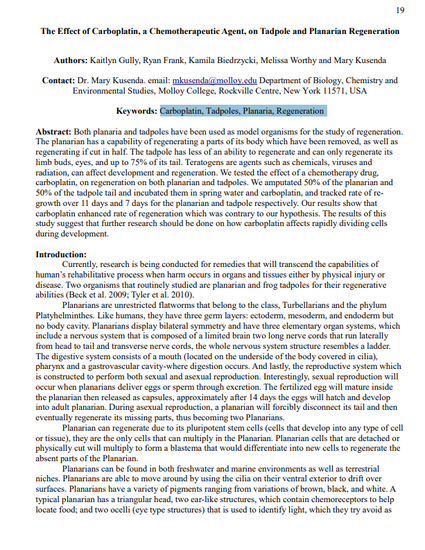
Article
The Effect of Carboplatin, a Chemotherapeutic Agent, on Tadpole and Planarian Regeneration
Science and Techonology Undergradute Research Notes (SATURN) Journal
(2017)
Abstract
Both planaria and tadpoles have been used as model organisms for the study of regeneration. The planarian has a capability of regenerating a parts of its body which have been removed, as well as regenerating if cut in half. The tadpole has less of an ability to regenerate and can only regenerate its limb buds, eyes, and up to 75% of its tail. Teratogens are agents such as chemicals, viruses and radiation, can affect development and regeneration. We tested the effect of a chemotherapy drug, carboplatin, on regeneration on both planarian and tadpoles. We amputated 50% of the planarian and 50% of the tadpole tail and incubated them in spring water and carboplatin, and tracked rate of regrowth over 11 days and 7 days for the planarian and tadpole respectively. Our results show that carboplatin enhanced rate of regeneration which was contrary to our hypothesis. The results of this study suggest that further research should be done on how carboplatin affects rapidly dividing cells during development.
Keywords
- Carboplatin,
- Tadpoles,
- Planaria,
- Regeneration
Disciplines
Publication Date
August, 2017
Citation Information
Kaitlyn Gully, Ryan Frank, Kamila Biedrzycki, Melissa Worthy, et al.. "The Effect of Carboplatin, a Chemotherapeutic Agent, on Tadpole and Planarian Regeneration" Science and Techonology Undergradute Research Notes (SATURN) Journal Vol. 6 Iss. 2 (2017) p. 19 - 24 ISSN: 2328-3092 Available at: http://works.bepress.com/mary-kusenda/9/